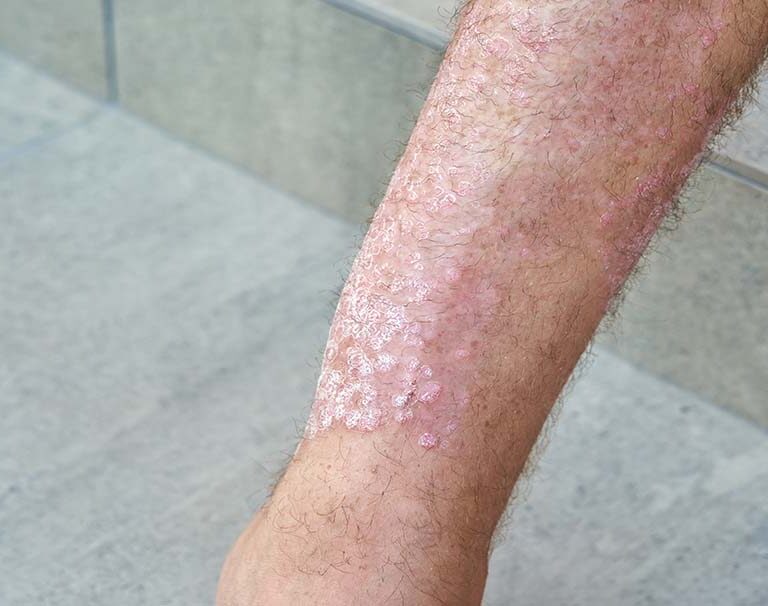PSORIASIS
HomePSORIASIS
PSORIASIS
Psoriasis is a type of ongoing skin disease experienced by adults. It is characterized by red and scaly patches of skin that have scaling over them. This problem happens because the process of skin cells coming to the surface happens too quickly, and the cells form layers before they’re able to mature. Psoriasis often first presents in young adulthood or old age. This leads people to wonder if it was caused by an infection, however, it is a genetic disease which nevertheless needs a trigger to show. That trigger could be stress, a sore throat, a medication, or a sun burn, for example. Psoriasis is usually only a skin disease, but sometimes the joint get inflamed too. The best way to understand why the skin is generating the rash lesions seen in psoriasis is that a gene needed for turning on and off the wound healing mechanism in the skin doesn’t work properly and can’t be turned off as easily after the skin gets injured. This explains why psoriasis often shows in areas subject to repeated trauma from friction, burns, infections, cuts, and scratches. Even though the tendency to develop psoriasis lesions is life-long and can not yet be cured, there are many effective medications to treat the condition. Most patients with proper treatment can completely clear their psoriatic lesions and stay clear for long periods of time. This makes it worth to make a trip to a dermatologist even if you have heard there is no cure.

Can psoriasis be cured?
Unfortunately, this skin condition is not curable, but it can be managed so that the patient can have a better life with reduced symptoms. Psoriasis treatment can make the symptoms less prominent and help the person feel better, sometimes clearing the problem areas entirely.
What treatments are used to manage psoriasis?
Dermatologists rely on a variety of treatments, including topical medications, oral medications, intravenous medicines, and light treatment. There are a variety of topical solutions, including corticosteroids, retinoids, and salicylic acid. Psoralen and ultraviolet A phototherapy (PUVA) and ultraviolet B phototherapy are types of light therapy that some doctors can perform. Non-topical medications for this disease include retinoids, methotrexate, cyclosporine, and biologic response modifiers. The different treatments can include side effects that a patient should discuss with the doctor. Many dermatologists recommend combination therapy that uses a mixture of the different treatment types.
Which treatment is right for me?
A dermatologist can help determine the right treatment options for each situation. The type of psoriasis is one factor that can affect the type of treatment needed. The different types include plaque, pustular, inverse, guttate, and erythrodermic psoriasis. A person could have more than one type, or the type could change over time, so the treatment may need to adapt. The location and size of the patches, how serious it is, and other factors also affect the type of treatment used.
Every year new medication with a better safety profile does emerge to help the millions of psoriatic patients all over the world. We can help you to understand how biologics work and why these are now considered the cornerstone for effective Psoriasis maintenance.
